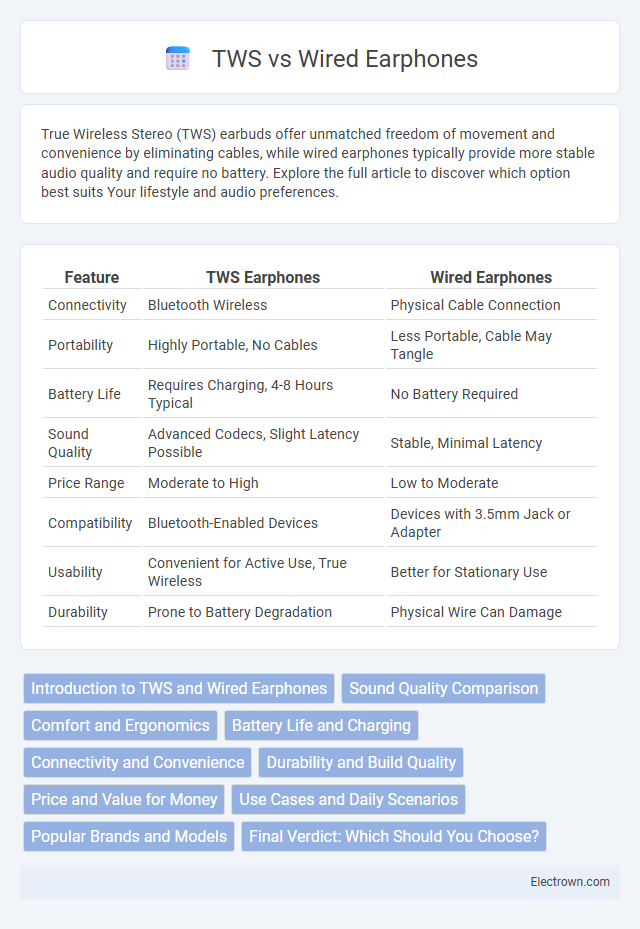True Wireless Stereo (TWS) earbuds offer unmatched freedom of movement and convenience by eliminating cables, while wired earphones typically provide more stable audio quality and require no battery. Explore the full article to discover which option best suits Your lifestyle and audio preferences.
Table of Comparison
| Feature | TWS Earphones | Wired Earphones |
|---|---|---|
| Connectivity | Bluetooth Wireless | Physical Cable Connection |
| Portability | Highly Portable, No Cables | Less Portable, Cable May Tangle |
| Battery Life | Requires Charging, 4-8 Hours Typical | No Battery Required |
| Sound Quality | Advanced Codecs, Slight Latency Possible | Stable, Minimal Latency |
| Price Range | Moderate to High | Low to Moderate |
| Compatibility | Bluetooth-Enabled Devices | Devices with 3.5mm Jack or Adapter |
| Usability | Convenient for Active Use, True Wireless | Better for Stationary Use |
| Durability | Prone to Battery Degradation | Physical Wire Can Damage |
Introduction to TWS and Wired Earphones
True Wireless Stereo (TWS) earphones offer complete cable-free convenience with seamless Bluetooth connectivity, providing freedom of movement and modern smart features like touch controls and voice assistant support. Wired earphones rely on a physical connection to your device, ensuring stable audio transmission, zero latency, and no need for battery charging, which appeals to users prioritizing sound quality and reliability. Choosing between TWS and wired earphones depends on your lifestyle preferences, whether you value wireless mobility or consistent, high-fidelity audio performance.
Sound Quality Comparison
True Wireless Stereo (TWS) earphones often deliver clear and immersive sound through advanced Bluetooth codecs like aptX and LDAC, yet wired earphones typically maintain superior sound quality by providing consistent audio signals with minimal latency and no compression. Wired earphones excel in delivering richer bass, higher dynamic range, and better detail clarity due to direct analog connections. Audiophiles frequently prefer wired options for critical listening, while TWS devices prioritize convenience at a slight cost to sound fidelity.
Comfort and Ergonomics
TWS earphones offer superior comfort with lightweight, ergonomic designs that fit securely in the ear canal, reducing pressure and fatigue during extended use. Wired earphones often feature bulkier components and cables that can cause discomfort or tangling, impacting overall wearability. Advanced TWS models include customizable ear tips and adaptive fit technologies that enhance long-term comfort and stability.
Battery Life and Charging
True Wireless Stereo (TWS) earphones rely on built-in rechargeable batteries offering typically 4 to 8 hours of continuous playback per charge, with charging cases providing additional full charges extending total usage time up to 24 to 30 hours. Wired earphones draw power directly from the connected device, eliminating battery life constraints and the need for charging, ensuring unlimited usage as long as the device has power. Charging convenience and battery longevity make TWS earphones suitable for wireless freedom, while wired earphones guarantee uninterrupted audio without battery dependence.
Connectivity and Convenience
TWS earphones offer seamless wireless connectivity through Bluetooth, eliminating the hassle of tangled cables and providing greater freedom of movement during activities. Wired earphones deliver stable and uninterrupted audio transmission without the risk of signal drops or battery dependence, ensuring reliable sound quality at all times. Your choice depends on whether you prioritize convenience and mobility with TWS or consistent connectivity with wired options.
Durability and Build Quality
True Wireless Stereo (TWS) earphones often feature compact, lightweight designs with water and sweat resistance, enhancing portability but sometimes compromising on long-term durability compared to wired earphones. Wired earphones generally offer more robust build quality with reinforced cables and durable materials, reducing the risk of damage from accidental pulls or bends. Your choice should consider whether you prioritize the convenience of wireless use or the proven durability that wired earphones typically provide.
Price and Value for Money
TWS earphones generally cost more upfront due to advanced features like wireless convenience and battery integration, while wired earphones offer more affordable options with consistent audio quality without battery constraints. Considering your budget, wired earphones provide better value for money in durability and long-term use, whereas TWS models justify their higher price with added mobility and modern technology benefits. Assessing your usage patterns and preferences will help determine which option offers the best price-to-performance ratio for your needs.
Use Cases and Daily Scenarios
TWS earphones offer unmatched convenience for workouts, commuting, and hands-free calls due to their wireless design and compact form factor. Wired earphones provide reliable audio quality and zero latency, making them ideal for studio monitoring, gaming, and situations where stable connection is critical. Your choice depends on whether you prioritize freedom of movement or consistent, high-fidelity sound in daily scenarios.
Popular Brands and Models
Popular True Wireless Stereo (TWS) earphones include the Apple AirPods Pro, Samsung Galaxy Buds Pro, and Sony WF-1000XM4, known for advanced noise cancellation and seamless device integration. Wired earphones such as the Sennheiser IE 300, Shure SE215, and Audio-Technica ATH-M50x offer superior audio fidelity with minimal latency and robust build quality. Consumer preferences often depend on factors like portability, sound quality, and microphone performance across these renowned models.
Final Verdict: Which Should You Choose?
True Wireless Stereo (TWS) earphones offer unmatched convenience and freedom of movement with no cables, ideal for active lifestyles and on-the-go use, while wired earphones typically provide more consistent audio quality and zero battery dependency, making them reliable for extended listening sessions. Audiophiles seeking superior sound clarity and latency often prefer wired models, whereas users prioritizing portability and ease of pairing lean towards TWS options. Your choice depends on whether portability or sound precision is the primary priority in your daily audio experience.
TWS vs Wired Earphones Infographic

 electrown.com
electrown.com